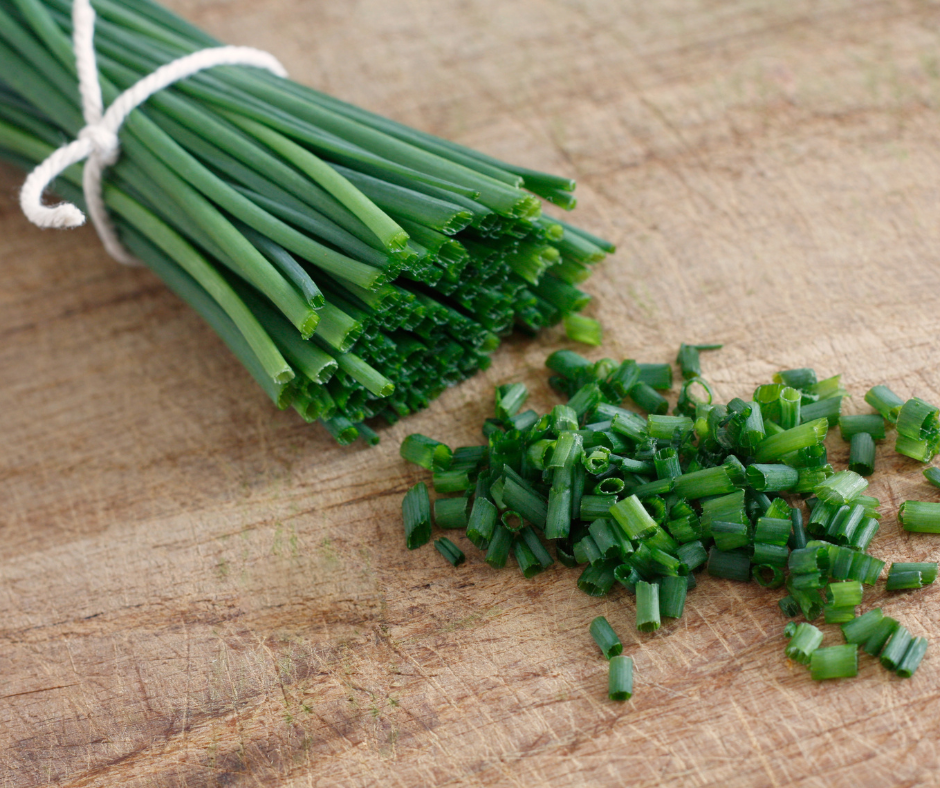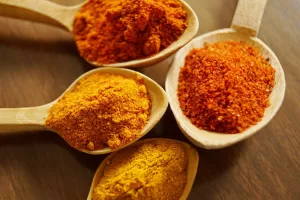Some weeds are edible, did you know that? You may think of weeds as invasive plants that grow in your garden, but some weeds are edible and there are many health benefits of chives. You probably eat them a lot too.
Chives, also known as Allium schoenoprasum, are a type of leafy green vegetable that tastes a little like spring onions but is much milder. They belong to the allium family, along with garlic, onions and leeks.

They are a staple of the Mediterranean diet and are usually eaten raw. But they’re also widely grown in places like Asia and Europe. Their mild, oniony flavour is similar to that of spring onions, but their appearance is quite different.
The stems of chives are exceptionally long and delicate, and are a uniform green colour. In contrast, the stem of a spring onion is firm and thick, starting white and turning green at the top.
This white part of the spring onion has a stronger onion flavour than chives. Sunlight and well-drained soil are ideal growing conditions for the plant.
With a hint of onion flavour, chives are an excellent choice for garnishing dishes. They are often added to Mexican dishes, salads, sauces, soups, potato dishes and fish because of their delicious, savoury flavour.
This lavender-flowered herb also has a wide range of medicinal uses. In addition, they are full of healthy nutrients but low in calories. They are a possible superfood due to their abundance of bioactive nutrients and antioxidants. We’ve rounded up all the good things they can do for your body.
What are the health benefits of chives?
1. Posses Cancer-Fighting Ability
Chives are a good source of the antioxidant flavonoids and the sulphur compound allicin. Allicin has been shown to reduce the risk of developing breast cancer and scientific studies support its role as a powerful antioxidant.
Lutein and zeaxanthin are also abundant in chives. These two flavonoid antioxidants are particularly effective against mouth and lung cancer. The high fibre content of chives also helps in the fight against colon cancer.
Several other studies have also shown that they can prevent prostate cancer. That’s because they help the body produce more glutathione. An anti-cancer agent, glutathione is a water-soluble antioxidant. It finds cancer-causing substances and makes them easier to get rid of. That’s why they are so good for fighting cancer.
2. Good for pregnancy
Pregnant women may benefit from eating chives because they’re a good source of folate. The importance of folate is often emphasised by doctors in pregnancy. It is an essential B vitamin that protects the baby’s developing brain and spinal cord from defects. Folate is also involved in the production of DNA and cell division.
3. Inhibition of microbial growth
The antimicrobial properties of chives are exceptional. It fights infections caused by viruses, bacteria and fungi. They can therefore protect us from harmful microbes and seasonal viruses. Chives’ ability to inhibit virus growth, fight foreign pathogens and boost immunity is due to their antiviral properties.
One study found that they were the most effective herb at preventing the growth of bacteria that can cause food poisoning. Herbal infusions made with chives are useful for treating yeast and viral infections.
4. Helps improve sleep quality and mood
The quality of your sleep can be improved by using chives. Choline, an active ingredient that promotes restful sleep, is abundant in this plant.
Choline is an essential nutrient that helps maintain the structure of cell membranes. The brain and nervous system rely on choline for a variety of functions, including mood regulation, memory retention and muscle control. Eating chives can be a good way to combat sleep problems.
Folic acid is also found in chives. It can stimulate the production of both serotonin and dopamine. The release of these hormones has been linked to an improved state of mind.
5. Stimulates hair growth
Chives extract can be used as a natural hair growth aid. The growth of new hair follicles is stimulated by its ability to fight scalp infections thanks to its antimicrobial properties.
They can also increase blood flow to the head by stimulating the scalp. Hair grows more easily when the blood supply is increased. Chive extract, when used as a hair wrap, is beneficial to the scalp and hair follicles.
6. Kidney stone treatment
Infusing either fresh or dried chive leaves can be effective in dissolving calcium oxalate crystals. Those pesky crystals are kidney stones.
Chives also contain ethyl acetate, an organic compound. It helps reduce swelling and can dissolve calcium-based kidney stones. This makes them a good herbal option for treating kidney stones.
7. Makes the heart healthier
The main compound in chives, allicin, lowers LDL or bad cholesterol and blood pressure. It achieves this by triggering the body to produce more nitric oxide. This lowers blood pressure by relaxing the artery walls.
Quercetin, another organic compound, is also found in them. It plays a crucial role in preventing arterial plaque, which in turn reduces the likelihood of stroke.
8. Safe for people with diabetes
The flavonoids in chives provide relief from diabetes-related complications. These flavonoids help to treat type 2 diabetes by preventing the progression of the disease.
Chives, with their low glycaemic index of 15, help to maintain stable blood sugar levels. In addition, a 5g serving of chives contains only 0.1g of carbohydrates, making it an attractive option for diabetics. Therefore, they do not cause a rapid rise in blood sugar.
When chives are used as a garnish, they are usually chopped into small rings and sprinkled over finished dishes. In addition, chives are delicious both raw and cooked. Their versatile flavour allows them to be used in recipes in place of garlic or spring onions, or to be added at a moment’s notice to dishes that already contain these flavours.
Avoiding chives is probably only necessary for those who already have an allergy or intolerance to onions or other alliaceous vegetables, but chive allergies are relatively rare. People with food allergies should consult a medical professional before adding chives to their diet.
Furthermore, some people may experience stomach discomfort after eating large amounts of chives. Nevertheless, anyone can safely include them in their diet if they are used sparingly.
Discover More: Looking for diabetic-friendly meals? Check out our new digital product, 35 Diabetic-Friendly Delicious Recipes, available now on Etsy!
Disclaimer: This is for informational purposes only.
Did you find this helpful? Let us know in the comments.
Source: Healthifyme
You can also visit our Facebook and YouTube pages to know more about plants and their health benefits.
You might also like:
- 12 Incredible Medicinal Uses Of Country Borage And How To Use It Effectively!
- How Important Is It To Know The Temple Tree’s Medicinal Benefits?
- Swamp Cabbage: Best Laxative And Antidote For Poisoning
- What Are The Health Benefits Of Asteracantha?
- 10 Interesting Medicinal Benefits Of Asparagus You Might Not Know About








